Are you ready to bring the bounty of a thriving vegetable garden right to your doorstep? With these expert vegetable garden tips, you’ll soon be cultivating your own organic oasis.
Growing your own vegetables at home not only provides a rewarding sense of accomplishment, but it can also save you money on groceries and promote sustainable living. In this article, we’ll cover everything you need to know to start your own vegetable garden, including selecting the right location, choosing the best plants for your climate, and maintaining a healthy, sustainable garden all year round.
Key Takeaways:
- Starting a vegetable garden can be a rewarding and cost-effective way to provide nutritious food for your family.
- Choosing the right location, soil, and plants is crucial for successful vegetable gardening.
- Organic gardening techniques, such as companion planting and using natural pest control methods, can help keep your garden healthy and thriving.
- Harvesting your own vegetables is not only rewarding but also promotes sustainable living and teaches children about real food.
- Container gardening is a great option for those with limited space, but proper care and maintenance are essential for success.
- Starting small and gradually expanding your garden can help build confidence and increase your chances of success.
- Maximizing yields and extending the growing season can be achieved through various techniques such as vertical gardening, crop rotation, and succession planting.
- Proper planning and preparation are crucial for starting a new vegetable garden, including choosing the right size, location, and soil.
Setting up the Vegetable Garden
Before you can dig your hands into the fertile soil, it’s important to set up your vegetable garden for success. The first step is choosing the right location for your garden. Make sure it receives at least 6-8 hours of sun each day, as most vegetables require ample sunlight to thrive. Additionally, ensure that your garden is in close proximity to a water source for easy watering.
The soil is also crucial to the success of your vegetable garden. It needs to be rich in nutrients and well-draining. Consider adding compost or other organic matter to improve soil quality.
When selecting plants for your garden, it’s important to choose ones that are suitable for your climate and season. The best vegetables to grow in a garden will vary depending on your location and time of year. Consider doing research online or consulting with a local gardening expert for guidance.
Maintaining a healthy vegetable garden is key to a bountiful harvest. Organic gardening techniques, such as using companion planting and natural pest control, are highly recommended.
Harvesting and enjoying the fruits of your labor is a rewarding experience. Vegetable gardens offer numerous benefits, including saving money, providing fresh and organic food for your family, reducing your carbon footprint, and connecting with nature.
Consider different techniques for your vegetable garden, including vertical gardening, container gardening, raised beds, crop rotation, succession planting, and companion planting. Starting small and gradually expanding your garden is a good approach for beginners.
Overall, setting up a vegetable garden is a fulfilling endeavor that offers numerous rewards for both you and your family. By carefully planning and maintaining a healthy garden, you can enjoy fresh and delicious vegetables throughout the growing season.
Choosing the Right Plants and Techniques
With a wide array of vegetable plants and gardening techniques to choose from, it’s important to make informed decisions when planning your bountiful garden. Organic gardening principles can save you money and provide nutrient-dense food for your family.
When selecting plants, it’s essential to choose those that are suitable for your climate each season. Additionally, utilizing organic gardening techniques like companion planting and natural pest control can contribute to a clean and productive garden. Making your own organic fertilizers, such as compost, can be a cost-effective and sustainable way to nourish your plants.
Considering light and temperature requirements, watering appropriately, using quality potting soil, providing proper drainage, and choosing the right containers are crucial factors to consider. The use of vertical gardening, container gardening, raised beds, crop rotation, succession planting, and companion planting can also be utilized to maximize space and improve plant growth.
Starting small and gradually expanding your garden will help beginners gain confidence in growing their own vegetables. Growing vegetables in your backyard garden offers various benefits, including health benefits, saving money, helping the environment, and enjoying the superior taste of homegrown produce.
By following these tips and incorporating organic gardening practices, you can create a healthy and sustainable garden that provides an abundance of delicious and nutritious vegetables throughout the year.

“The greatest fine art of the future will be the making of a comfortable living from a small piece of land.”
― Abraham Lincoln
Growing Vegetables in Containers
Don’t have a spacious backyard? No problem! Container gardening allows you to grow a variety of vegetables even in limited space. Whether you have a small balcony or a tiny patio, you can create a productive garden that provides your family with fresh and nutritious food.
One of the biggest advantages of growing vegetables in containers is its sustainability factor. It reduces your carbon footprint by eliminating the need for grocery store produce that may have traveled long distances. You can also save money and enjoy the taste of freshly harvested produce.
When starting your container garden, choose a location that receives 6-8 hours of sunlight daily and has nutrient-rich soil. It’s important to choose plants that are suitable for your climate and use organic gardening techniques to keep your garden clean and healthy.
Proper light, temperature, water, and drainage are crucial when growing vegetables in containers. Use high-quality potting soil, provide adequate nutrition through fertilizers, and select the right containers. Different planting techniques such as vertical gardening, container gardening, raised beds, and succession planting can help maximize space and yield. Practicing crop rotation and companion planting can also improve the health and productivity of your vegetable garden.
Starting small and expanding as you gain confidence is recommended for beginners. Growing your vegetables at home not only saves money and improves your health, but also benefits the environment and enhances the taste of the produce. Harvesting your vegetables and cooking meals with them can be a rewarding experience that brings your family together.
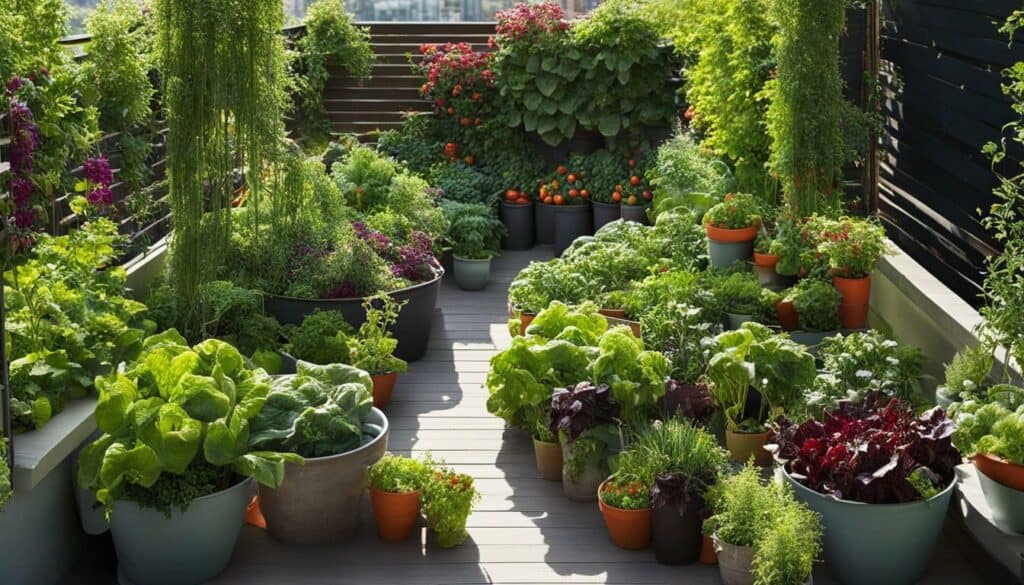
Getting Started with Vegetable Gardening
Embarking on a journey into vegetable gardening? Let’s start with the basics and guide you toward a successful, rewarding experience. Getting started with vegetable gardening is a great way to provide your family with fresh, nutrient-dense food while saving money and reducing your carbon footprint. You don’t need a large space or horticulture degree to start a successful organic garden.
Begin by choosing a location that gets 6-8 hours of sun a day and ensuring your soil is rich in nutrients. This will help your vegetables grow strong and healthy. Don’t have great soil? No problem! Composting and incorporating organic matter can create the perfect environment for your plants to thrive.
Select the right plants for your climate. Different regions require different types of plants. You can check with your local nursery or cooperative extension service to find out which plants are best suited for your area. Start with easy-to-grow vegetables like peas and lettuce, which require less maintenance and are more forgiving for the beginning gardener.
Employ organic gardening techniques like making your own fertilizers and practicing companion planting. Companion planting involves planting different crops together that benefit each other. For example, planting onions alongside carrots can help to deter pests. Plus, making your own fertilizers from compost or natural ingredients is not only cost-effective but also environmentally friendly.
Harvesting your vegetables and enjoying them with your family is a rewarding experience. It can bring your family closer together and teach kids about where real food comes from. Container gardening is also a popular option, allowing you to grow vegetables in smaller spaces. Provide the right amount of sunlight, temperature, water, quality potting soil, and drainage for your plants. Choose suitable containers like wooden, self-watering, ceramic, or even DIY options.
Remember to practice crop rotation and succession planting. This will help to keep your soil healthy and ensure a continuous supply of fresh vegetables. Crop rotation involves rotating different crops in and out of the same space, while succession planting involves planting crops at different times to ensure a steady supply of vegetables throughout the growing season.
Whether you have a large yard or just a small patio, growing your own vegetables is a rewarding and sustainable endeavor. So go ahead, get your hands dirty, and enjoy the fruits of your labor!
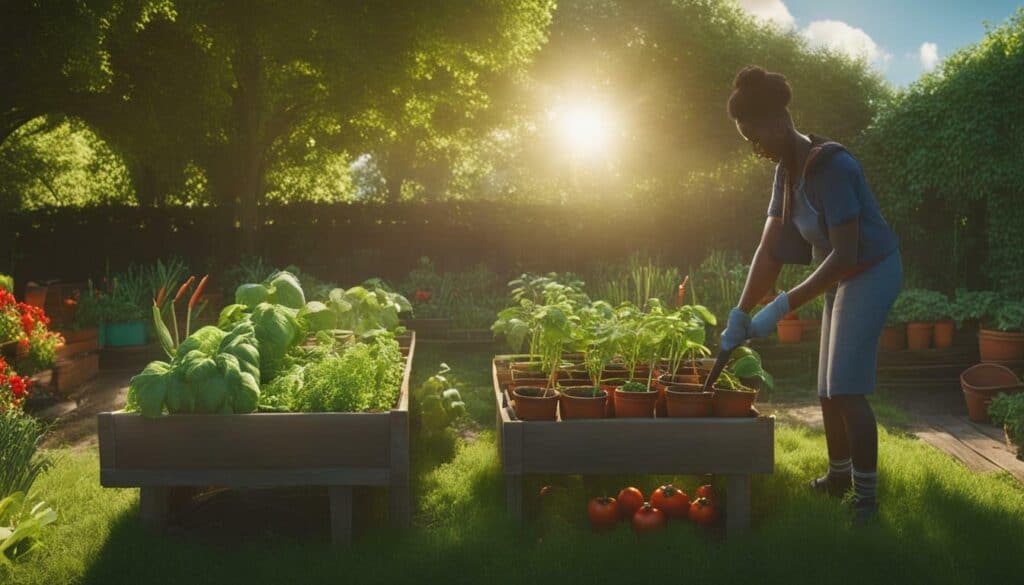
Harvesting for Your Garden Kitchen
After all the hard work and anticipation, it’s time to bring the vibrant colors and flavors of your vegetable garden straight into your kitchen. Growing vegetables at home not only provides your family with fresh, nutrient-dense produce, but it’s also a great way to promote sustainability and teach children about real food.
Cooking and storing your homegrown vegetables is a rewarding experience that can save you money on groceries and ensure that you’re using high-quality, organic produce in your meals. Plus, the taste of freshly picked vegetables simply can’t be beat!
When it comes to harvesting your produce, timing is key. Wait until your vegetables are fully mature and ripe before picking them for optimal flavor and nutrition. Be sure to handle them gently to avoid bruising or damaging the delicate skin.
If you’re short on space, consider growing vegetables in containers. Container gardening is a great way to save space and provide fresh produce throughout the year. When choosing a container, select one that is the right size for your plants and provides adequate drainage. Providing the right amount of light and temperature, watering appropriately, using quality potting soil, feeding your plants, and creating optimal drainage are all important factors to consider when growing vegetables in containers.
Starting a vegetable garden can be intimidating for beginners, but starting small and choosing a few favorite veggies to grow can help build confidence. There are numerous benefits to growing your own vegetables, including improved health, cost savings, environmental sustainability, and better taste. There are various growing techniques to choose from, such as vertical gardening, container gardening, raised beds, crop rotation, succession planting, and companion planting. It’s important to plan the size, location, and soil for your vegetable garden before getting started.
Harvesting vegetables from your garden is a great way to bring sustainable, nutrient-dense food to your family’s table. Get started today and experience the satisfaction of growing your own produce!
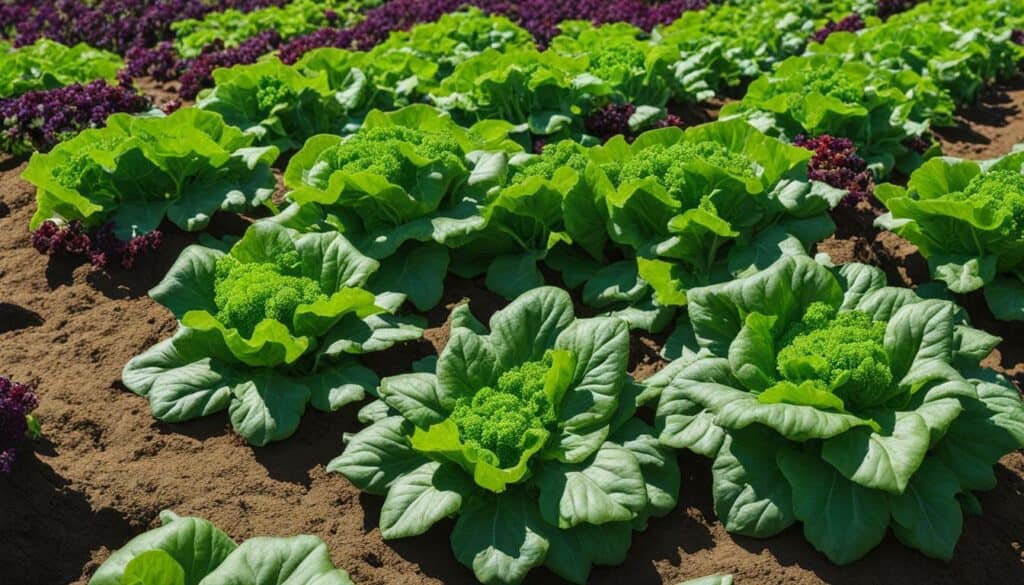
Tips for Starting a New Vegetable Garden
Starting a new vegetable garden is an exciting endeavor, but it’s essential to lay a solid foundation for success. Here are some tips to consider when starting your own vegetable garden:
1. Location is crucial. Choose a spot that gets 6-8 hours of sunlight daily and has good soil with rich nutrients. Proper watering and mulching are also essential for successful growth.
2. Consider the climate and season when selecting plants for your garden. Organic gardening techniques such as making your own fertilizers, companion planting, and organic pest control can help promote healthy growth.
3. Harvesting and enjoying your vegetables is a rewarding experience for the whole family. Not only does starting a vegetable garden save money, it also provides healthier and tastier produce while promoting environmental sustainability.
4. If growing vegetables in containers, consider the size and depth of the container based on the plant’s root system. High-quality potting soil, proper light, temperature, and watering are all crucial factors for success. Suitable container options include wood, self-watering, ceramic, or DIY options with adequate drainage.
5. Starting with a small garden or containers is recommended for beginners, and as confidence grows, the garden can be expanded. Vertical gardening, raised beds, crop rotation, succession planting, and companion planting are all growing techniques that can maximize space and improve plant health.
6. There are many benefits to growing vegetables, such as exercise, access to fresh and organic produce, cost savings, environmental benefits, and superior taste. Starting a vegetable garden can be easy and rewarding, regardless of available space or gardening experience.
7. It’s important to prioritize the size, location, and quality of the soil when starting a new vegetable garden. Start small and gradually expand, ensuring proper sunlight, watering, and use of suitable containers or garden beds.
Remember, these tips are a general overview, and further research may be necessary to achieve the specific goals of your vegetable garden.
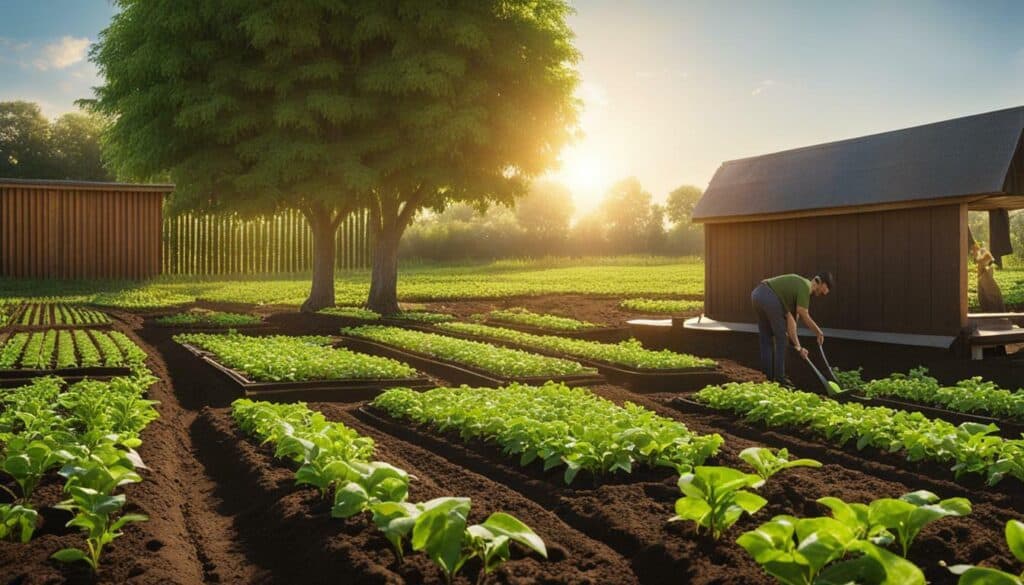
Creating a Healthy and Sustainable Garden
Keeping your vegetable garden healthy and thriving requires ongoing care and attention throughout the growing season. To maintain a healthy vegetable garden, it is essential to incorporate organic gardening practices such as composting, crop rotation, and natural pest control.
One of the most important factors in creating a healthy garden is soil quality. Soil provides the essential nutrients and minerals that plants need to grow and thrive. It is important to start with high-quality soil that is rich in organic matter and free from contaminants. This can be achieved by adding compost or well-rotted manure to the soil.
It is also important to choose the right plants for your climate and growing conditions. When selecting plants, consider their disease and pest resistance, as well as their growth habit and size. Companion planting can also be used to create a healthy garden by cultivating plants that complement each other and repel pests.
| Organic gardening techniques for a healthy vegetable garden: |
|---|
| Use compost or well-rotted manure to improve soil quality and fertility |
| Rotate crops each season to prevent soil-borne diseases and pests |
| Practice natural pest control methods such as hand-picking pests and using insecticidal soap or neem oil |
Container gardening is a convenient way to grow vegetables in small spaces, such as patios or balconies. When growing vegetables in containers, it is important to use a high-quality potting mix, provide proper drainage, and select the right container size for each plant. Container gardening is also a great option for those who want to extend the growing season by moving plants indoors during colder months.
Exploring different growing techniques such as vertical gardening, raised beds, crop rotation, and succession planting can also enhance your vegetable garden. These techniques can help maximize yields, optimize space, and promote soil health.
In conclusion, creating a healthy and sustainable garden requires attention to soil quality, plant selection, and organic gardening practices. By taking the time to choose the right plants for your climate, incorporating natural pest control methods, and exploring different growing techniques, you can create a garden that yields fresh and nutritious produce while promoting environmental consciousness and family connection.
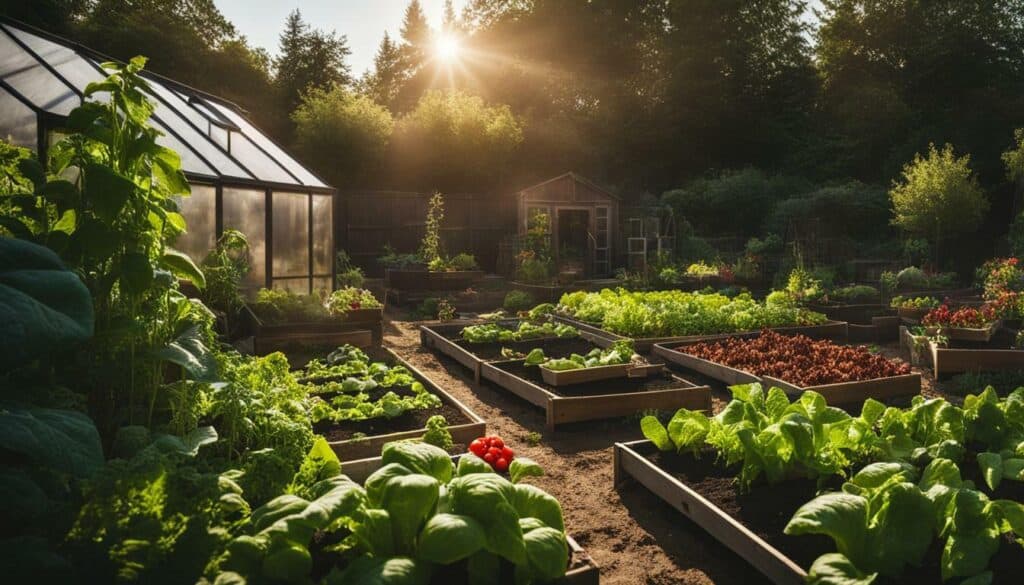
Expert Advice for Maximizing Yields
For seasoned gardeners looking to take their vegetable-growing skills to the next level, these expert tips will help you achieve abundant yields and a thriving garden.
Location is key when it comes to vegetable gardening. Ensure your garden receives at least 6-8 hours of sunlight daily for optimal growth. Additionally, make sure that your soil is nutrient-rich and that you follow proper watering and mulching techniques to keep your plants healthy and hydrated.
Choosing the right plants for your climate and season is crucial for a healthy garden. Organic gardening techniques, like making your own fertilizers and companion planting for pest control, can also enhance your garden’s productivity.
Container gardening is a great option for those with limited space. Choose containers that are adequate in size and provide proper drainage. High-quality potting soil should be used, as it ensures proper growth and helps prevent weeds and soil-borne diseases. Regular feeding of your plants with organic fertilizers, such as liquid fish emulsion, is crucial for their nutrition.
Vertical gardening is a great technique for maximizing yields, allowing for more food to be grown in less space. Raised beds are another option, particularly for those with poor-quality soil. Crop rotation and succession planting help in preventing pest and disease issues and prolonging the harvest period.
Companion planting is a method that involves grouping vegetables that benefit each other together, leading to enhanced flavor, pollinator attraction, and shade for heat-sensitive crops. These techniques can improve the overall health and productivity of your vegetable garden.
When starting a new vegetable garden, it’s important to carefully plan the size, location, and soil preparation. It’s advisable to start small and gradually expand as you gain more experience and confidence. Growing your own vegetables not only provides you with fresh and nutritious food but also saves money and has positive environmental impacts.
By following expert advice for maximizing yields, you can create a productive and enjoyable vegetable garden that will nourish both your body and soul.

Conclusion
With these expert vegetable garden tips, you have all the knowledge and guidance you need to cultivate a fruitful garden that will bring joy and nourishment to your home. Growing your own vegetables not only provides you with fresh, healthy produce but it can also save you money, improve your overall well-being, and help reduce your carbon footprint.
Whether you have a large garden or limited space, there are various techniques you can use to grow your own vegetables, such as vertical gardening, container gardening, raised beds, crop rotation, succession planting, and companion planting. It’s important to start small and gradually expand your garden, choosing a location with adequate sunlight and nutrient-rich soil.
By incorporating these tips and techniques, you can enjoy the taste and satisfaction of homegrown vegetables while enjoying the numerous benefits they offer. Not only is it a rewarding and beneficial endeavor, but growing your own vegetables also promotes sustainability and self-sufficiency.
FAQ
Q: What are some tips for setting up a vegetable garden?
A: Choose a location that receives 6-8 hours of sun a day, ensure the soil is rich in nutrients, and use water and mulch to regulate soil temperature.
Q: How do I choose the right plants and techniques for my vegetable garden?
A: Select plants suitable for your climate, practice organic gardening techniques such as making organic matter and companion planting, and use plants for organic pest control.
Q: What are some tips for growing vegetables in containers?
A: Choose the right size container for your plants, provide sufficient light and temperature, water your container garden diligently, use high-quality potting soil, feed your plants with fertilizer, and ensure proper drainage.
Q: How do I get started with vegetable gardening?
A: Start small and choose a few favorite vegetables, enjoy the benefits of growing your own organic food, and explore different techniques like vertical gardening, container gardening, raised beds, crop rotation, succession planting, and companion planting.
Q: What are some tips for starting a new vegetable garden?
A: Consider the size, location, and soil quality when starting a new vegetable garden.
What Are Some Expert Tips for Beginners to Start a Vegetable Garden?
If you’re a beginner looking to start a vegetable garden, follow these simple garden steps for beginners. First, choose the right site with adequate sunlight and access to water. Prepare the soil by removing weeds and adding compost. Select easy-to-grow vegetables and start small. Regularly water and fertilize your plants. Lastly, embrace patience and enjoy the satisfying process of growing your own fresh produce.
Source Links
- https://www.bountyparents.com.au/expert-advice/organic-vegetable-garden/
- https://getbusygardening.com/growing-vegetables/
- https://www.thespruce.com/vegetable-container-gardening-for-beginners-848161
- https://www.almanac.com/vegetable-gardening-for-beginners
- https://www.bhg.com/gardening/vegetable/vegetables/planning-your-first-vegetable-garden/
- https://savvygardening.com/how-to-start-a-vegetable-garden/
- https://simplifylivelove.com/gardening-tips-and-tricks/
- https://youshouldgrow.com/vegetable-gardening-tips-for-beginners/
- https://www.almanac.com/content/container-gardening-vegetables
- https://lovelygreens.com/container-vegetable-gardening/
- https://extension.umn.edu/planting-and-growing-guides/harvesting-and-storing-home-garden-vegetables
- https://www.allthatgrows.in/blogs/posts/harvesting-vegetables-crops
- https://www.farmersalmanac.com/how-to-store-preserve-fruits-vegetables-garden-124627
- https://savvygardening.com/6-things-every-new-vegetable-gardener-needs-to-know/
- https://www.bhg.com/gardening/yard/lawn-care/10-tips-for-sustainable-gardening/
- https://www.homesandgardens.com/gardens/create-an-eco-friendly-garden-220348
- https://naturezedge.com/sustainable-vegetable-gardening
- https://news.vt.edu/articles/2023/03/garden_budget_tips_expert.html
- https://extension.psu.edu/maximizing-your-vegetable-garden
- https://www.growingagreenerworld.com/tips-for-growing-the-perfect-vegetable-garden/
- https://content.ces.ncsu.edu/home-vegetable-gardening-a-quick-reference-guide
- https://www.gardengatemagazine.com/review/start-a-vegetable-garden/
- https://gardensavvy.com/gardening-blog/gardening-tips/the-ultimate-guide-to-starting-a-vegetable-garden-for-beginners/

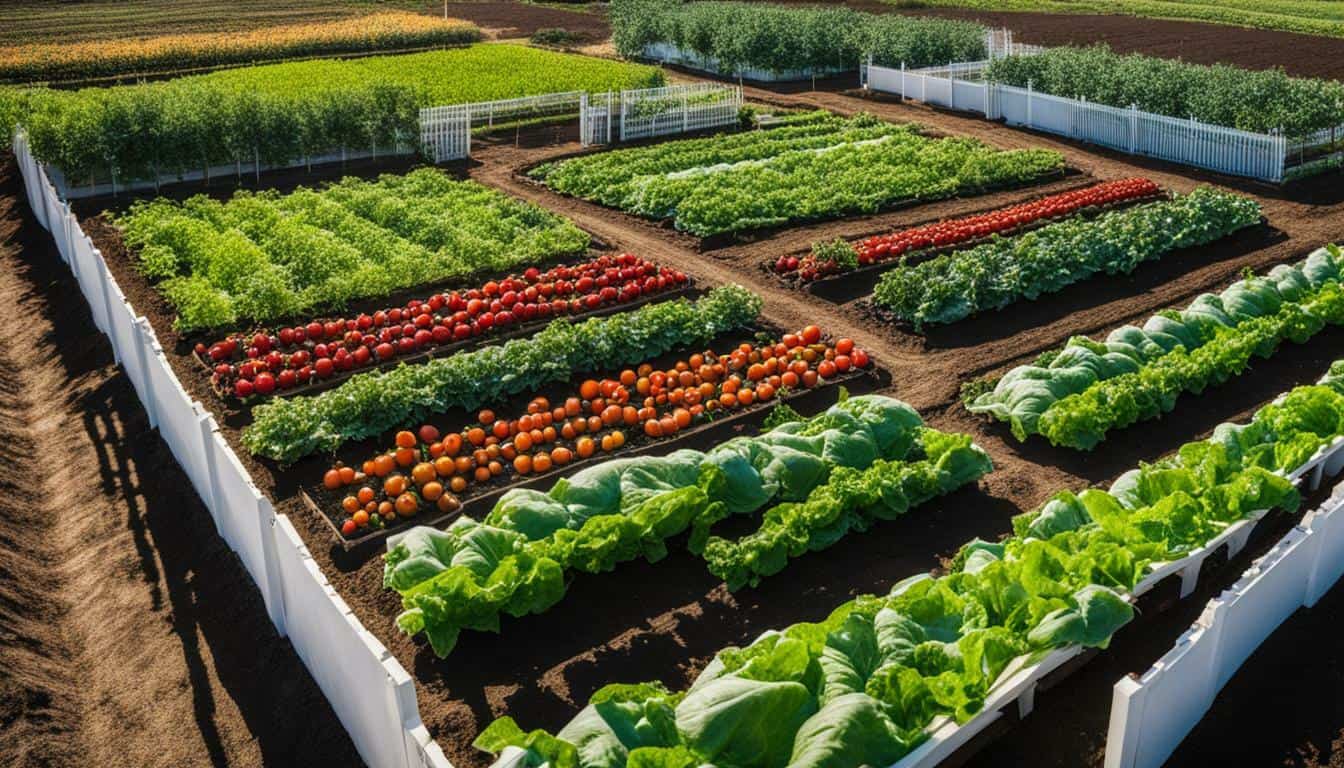
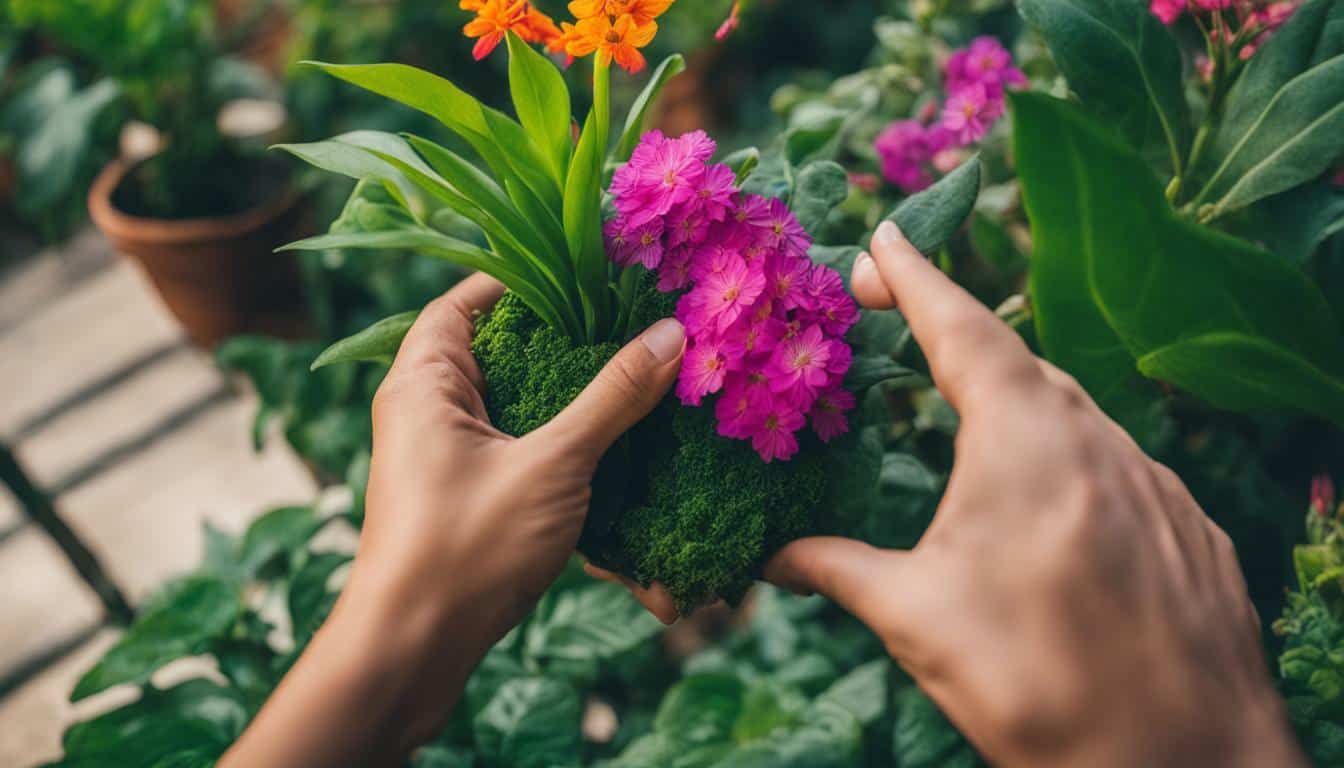
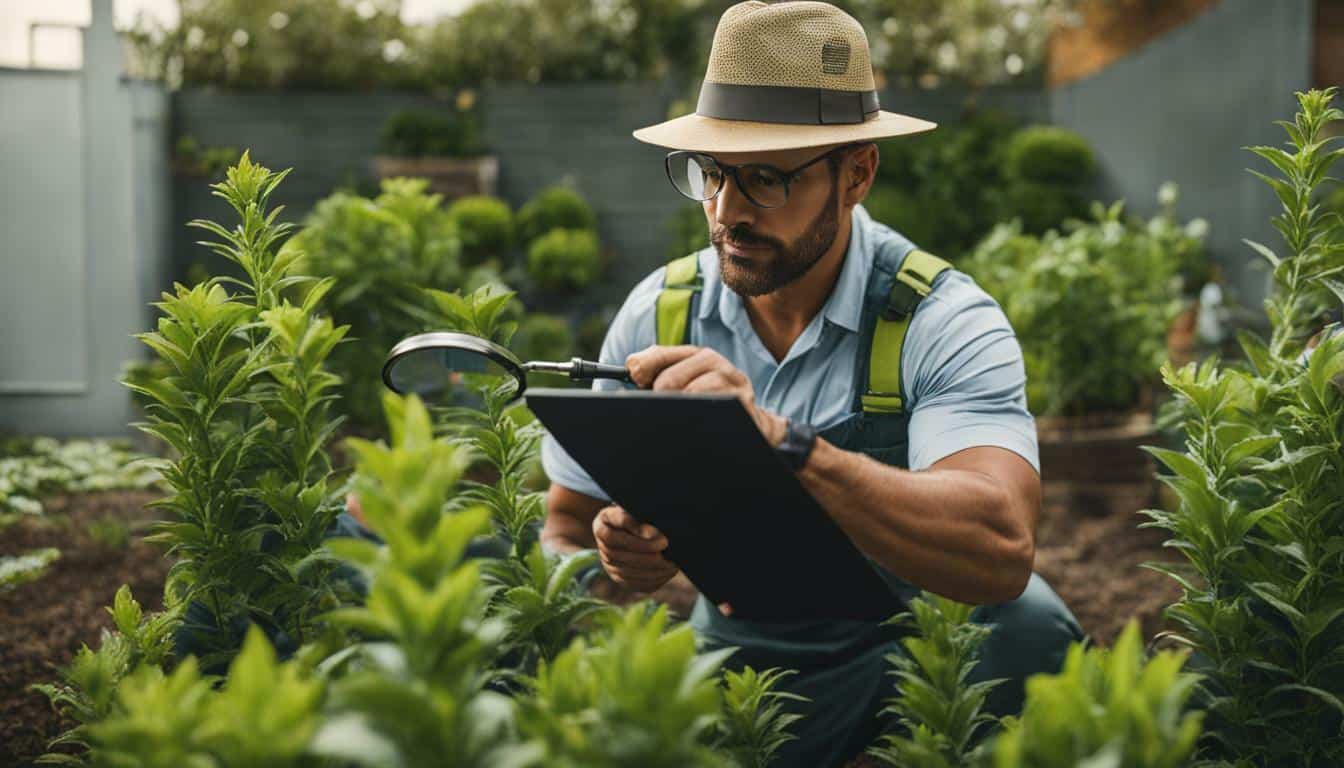

Leave a Reply